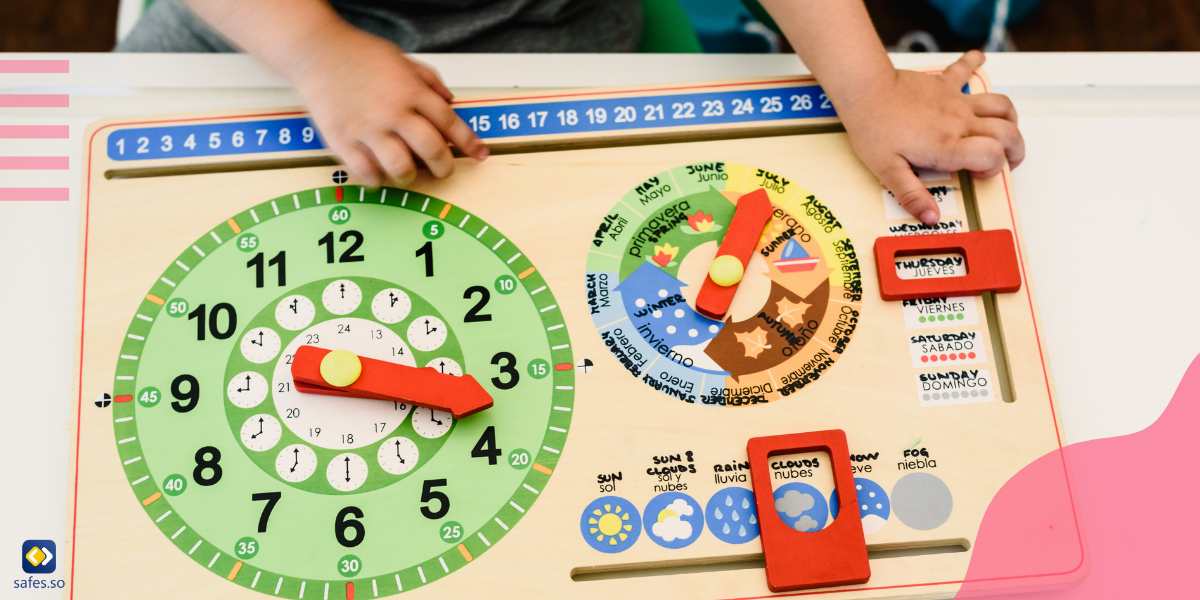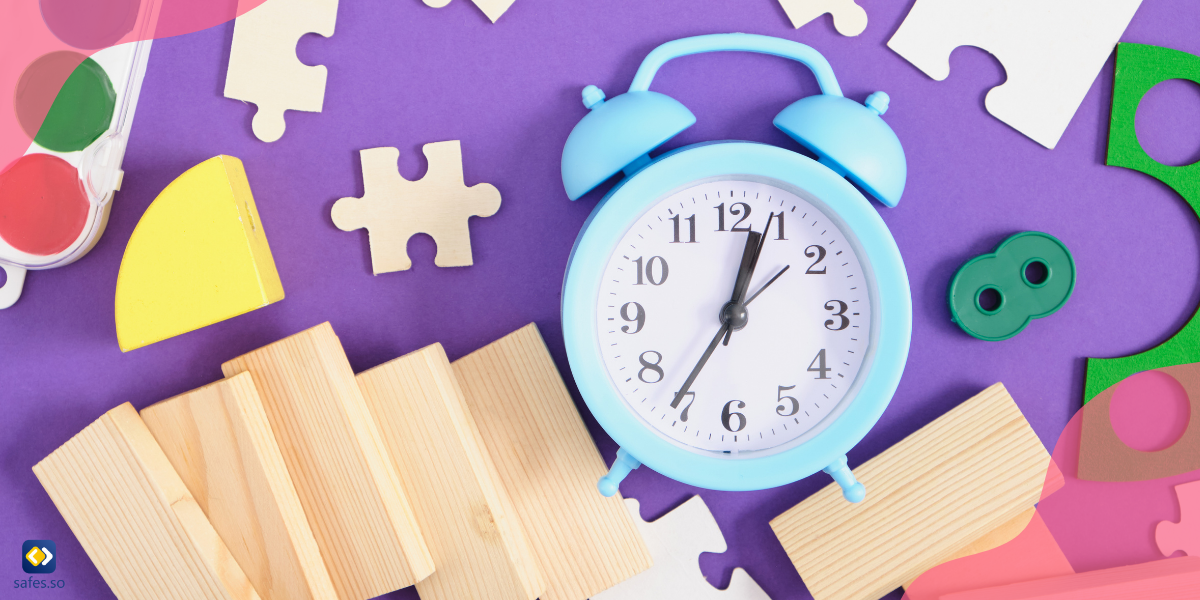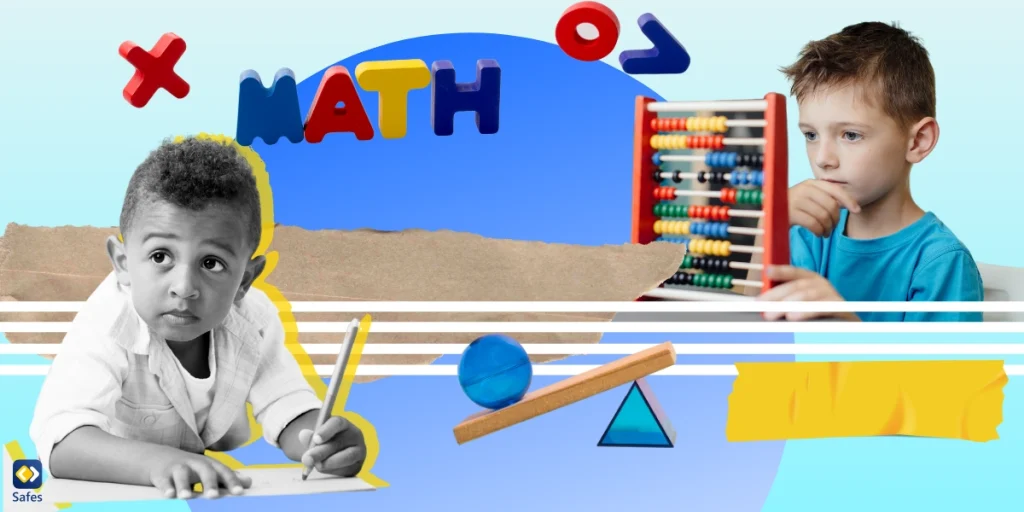All children have to learn how to tell time at a certain point in life; the sooner, the better. Being able to tell time can help children in different aspects of life. Children can learn time management, planning, and organization better by learning to tell time. And as those who play family board games know, the best way to teach a child is to play a game. Here are a few age-appropriate clock games for kids you can try out at home.
Download and Start Your Free Trial of the Safes Parental Control App
While learning to tell time through fun activities is helpful, it’s important to be cautious about the content children are exposed to, such as inappropriate games for kids. Ensuring that games are both educational and age-appropriate can make a big difference in a child’s development.
Types of Clock Games
Clock games are games that involve telling time using analog or digital clocks. These time games for kids are usually designed for children to learn how to read clocks and understand concepts such as hours, minutes, seconds, AM/PM, etc. Clock games can be categorized as such:
- Games that require setting the time on an analog clock to match a given digital time. Examples include: Set the Clock, Clock Challenge, Time Teller.
- Games that require matching simple analog times with digital equivalents. Examples include: Clock Match, Time Matching, Clockwise.
- Games that require answering multiple-choice questions about telling time using analog and digital clocks. Examples include: Telling Time Quiz, Time Test, Clock Quiz.

Clock Games for Kids
There are a lot of clock games for kids on the market. Here are a few examples of telling time games for kids.
Clock Games for Toddlers
Here are some examples of clock games for toddlers that you can find online:
- Online Telling Time Games for Kids: This game helps toddlers practice telling time by matching analog and digital clocks. The game has three different modes: whole hours, quarters, and every five minutes. The game also has colorful graphics and sounds to keep toddlers engaged.
- Dino Bones: Telling Time to the Half-Hour Game: This game helps toddlers practice telling time to the half-hour by digging up dinosaur bones. Toddlers have to drag the bones onto the analog clock that shows the same time as the digital clock. The game has cute dinosaurs and fun animations to motivate toddlers.
- Telling Time in the Sky Game: This game helps toddlers practice telling time by flying a plane in the sky. Toddlers have to move the plane to the analog clock that matches the digital time shown on the screen. The game has bright colors and cheerful music to entertain toddlers.
Clock Games for Preschoolers
Some clock games that are suitable for preschoolers are:
- Cloud Catcher: A game where kids have to catch the clouds that show the correct time to the hour or half-hour.
- Dino Fishing: A game where kids have to fish for dinosaurs that show the correct time to the hour or half-hour.
Clock Games for School Kids
There are many clock games for school kids that you can use to help them learn to tell time. Here are some examples you can find online:
- Clock Match: Time to 5 Minutes Game: This game helps kids practice matching simple analog times with digital equivalents. Kids have to drag the digital clocks onto the analog clocks that show the same time. The game has four levels of difficulty, from hours to 5-minute intervals.
- Interactive Clock: This game allows kids to manipulate the hands of an analog clock and see the corresponding digital time. Kids can also toggle the digital display on and off, and switch between 12-hour and 24-hour formats. The game can be used to show any time, or to challenge kids to remember or estimate times.
- Teaching Clock: This game helps kids explore telling time in both analog and digital formats. Kids can move the hour and minute hands on the analog clock, and see the digital time change accordingly. They can also change the speed of the clock, and see how the time changes over a day.

Benefits of Clock Games
Playing games for telling time can have many benefits for children’s development and well-being. Here are some of them:
- Playing clock games can help children develop their motor skills: Physical fun such as moving the hands of an analog clock or tapping on a digital clock can help children improve their hand-eye coordination, fine motor skills, and spatial awareness.
- Playing clock games can help children learn to tell time: Clock games can make learning time fun and engaging for children. They can practice reading analog and digital clocks, and learn concepts such as o’clock, half past, quarter to, and quarter past. They can also write down the times they make on the clock to reinforce their learning.
- Playing clock games can help children build their confidence and emotional intelligence: Clock games can provide children with a sense of achievement and satisfaction as they master a new skill. They can also help them cope with frustration and failure, and learn to take risks and challenges in a safe environment.
- Playing clock games can increase children’s awareness of time: Clock games can help children develop a sense of time and how it passes in their everyday lives. They can learn to estimate how long an activity takes, how to manage their time effectively, and how to be punctual and respectful of others’ time.
Aside from online clock games, video games in general also have their own set of benefits. There are several advantages of video games for personal skills, such as problem-solving, multitasking, and strategic thinking. However, it’s important to be mindful of the risks, such as video game addiction, which can negatively impact a child’s well-being if not properly managed.
How to Find the Best Clock Games for Kids
Here are some tips on how to find the best clock games for your child:
- Look for clock games that are appropriate for your child’s age and skill level: Clock games can vary in difficulty and complexity, depending on the age and grade of the target audience. For example, some clock games are designed for kindergarten through 2nd grade, while others are suitable for older children. You can also look for clock games that match your child’s learning objectives, such as reading analog and digital clocks, identifying AM and PM, or telling time to 5-minute increments.
- Look for clock games that are interactive and engaging: Clock games that allow your child to manipulate the hands of an analog clock or tap on a digital clock can be more fun and effective than passive games that only show the time. You can also look for clock games that provide feedback and reinforcement, such as sound effects, animations, or scores. Additionally, you can look for clock games that have different modes or levels of challenge, such as timed tests or puzzles.
- Look for clock games that are reliable and reputable: Clock games that are created by trusted sources, such as educational websites or organizations, can be more accurate and reliable than random games on the internet. You can also look for clock games that have positive reviews or ratings from other users or experts. Furthermore, you can look for clock games that are safe and secure, such as those that do not require personal information or downloads.
Conclusion
Games are a great way to help children learn how to tell time on clocks. Clock games for kids make learning a fun experience and can also have other benefits for children. If your child isn’t paying attention to the telling time activity, you can use their device’s parental controls (such as the parental controls on Android) or a parental control app like Safes. This way they can focus on learning to tell time instead of wasting time on games, social media, and screen addictions. Feel free to download Safes on iOS or Android today and start your free trial to explore its full potential.
Your Child’s Online Safety Starts Here
Every parent today needs a solution to manage screen time and keep their child safe online.
Without the right tools, digital risks and excessive screen time can impact children's well-being. Safes helps parents set healthy boundaries, monitor activity, and protect kids from online dangers—all with an easy-to-use app.
Take control of your child’s digital world. Learn more about Safes or download the app to start your free trial today!




